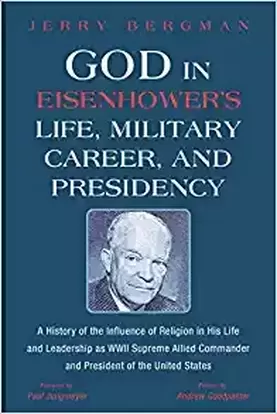But until recently, I hadn’t thought about why those years were so sweet. And then I read Dr. Jerry Bergman’s new book, God in Eisenhower’s Life, Military Career and Presidency (Wipf & Stock, 2019).
In a nutshell: Like so many citizens in the wake of World War II, during which he served as Supreme Allied Commander in Europe, General Dwight D. "Ike" Eisenhower was an unabashed Christian. And he did all he could to encourage his fellow Americans to recognize and honor the God of the Bible—the very God on whom this nation was founded, as politically incorrect as it may be to say so today.
According to this thoroughly researched and well-footnoted spiritual biography, Ike’s powerful faith was one of the reasons he won the presidency in 1952. As the Episcopal Church News reported, Eisenhower “insisted that only by trusting in God could he effectively carry out the responsibilities of the office and help the United States solve its problems.” On the other hand, his opponent Adlai Stevenson, a Unitarian, claimed that “A man’s personal religious beliefs [have] no proper place in our political life” (p. 106).
Apparently the American people sided with Eisenhower in this debate; he won by a landslide.
Eisenhower has been called “the most religious president in our history” (p. 142). Consider just a few of the ways he honored our Creator:
- It was under his presidency that “In God We Trust” became, by law, our national motto, printed on our paper currency in addition to our coins.
- He worked with Congress to add the words “under God” to the Pledge of Allegiance.
- He instituted the Christian National Prayer Breakfast in the White House.
- His administration helped to establish the National Day of Prayer.
- He was the first Commander in Chief to mail presidential Christmas cards.
- He supported a wide range of religious programs sponsored by non-governmental organizations, including the American Legion's “Back to God” program.
What’s more, in his public addresses, Eisenhower often discussed God’s importance to our nation—saying, for example, that “Without God, there could be no American form of government, nor an American way of life. Recognition of the Supreme Being is the first—and most basic—expression of Americanism” (p 138).
Eisenhower may have been tolerant of other belief systems, but he personally was a Bible-believing Christian. As biographer Virgil Pinkley wrote, “Wherever he was quartered or headquartered, I never saw Ike Eisenhower without a Bible somewhere in sight … It was a Bible for use, as the well-worn pages showed.” (p. 145)
This biography is especially edifying in light of our nation’s current problems. There’s no doubt that we’re in serious trouble today, with politicians competing desperately to see who can throw the most money at whatever ails us. Why in the world don’t they instead look back to the last time we got it right, and return to the policies and institutions that made it so right? That would take us straight back to the 1950s, when family and church were at the center of American life and when the leader of the free world refused to be cowed by the forces of evil and the father of lies.
I do have one major reservation about this book: its somewhat sympathetic portrayal of Jehovah’s Witnesses and their governing Watchtower Society. Ike’s parents were active members. And although he left the organization as an adult and became a Presbyterian upon marrying Mamie, he did grow up under Watchtower teachings—a fact the reader is reminded of frequently.
Dr. Bergman does address the aberrations of this religion, but not in any comprehensive way until Appendix I. I therefore mention it here, lest any reader be led to believe that the Watchtower is a Christian denomination, or that Jehovah’s Witnesses are Christians. It is not, and they are not. In fact, they have been taught to deny virtually all the key doctrines of orthodox Christianity—including Christ’s substitutionary death on the cross, salvation by faith alone, the Trinity, the personhood of the Holy Spirit and the full deity of Christ. This makes them, by definition, a cult (see the late Walter Martin's classic The Kingdom of the Cults for details).
This caveat aside, I found Dr. Bergman’s biography to be a fascinating exploration of President Eisenhower’s character, faith, and contributions to America’s spirituality in the idyllic decade of my childhood. 21st century Americans could learn a great deal of value from this account.

 RSS Feed
RSS Feed